Trending Now
We have updated our Privacy Policy and Terms of Use for Eurasia Group and its affiliates, including GZERO Media, to clarify the types of data we collect, how we collect it, how we use data and with whom we share data. By using our website you consent to our Terms and Conditions and Privacy Policy, including the transfer of your personal data to the United States from your country of residence, and our use of cookies described in our Cookie Policy.
{{ subpage.title }}
10 memorable quotes on GZERO World with Ian Bremmer in 2024
On our award-winning weekly global affairs show, GZERO World, Ian Bremmer explains the key global stories of the moment and sits down for in-depth conversations with the newsmakers and thought leaders shaping our world. In no particular order, here’s a look back at the 10 most quotable moments from this year’s episodes.
Adam Grant on how AI is changing the world of work
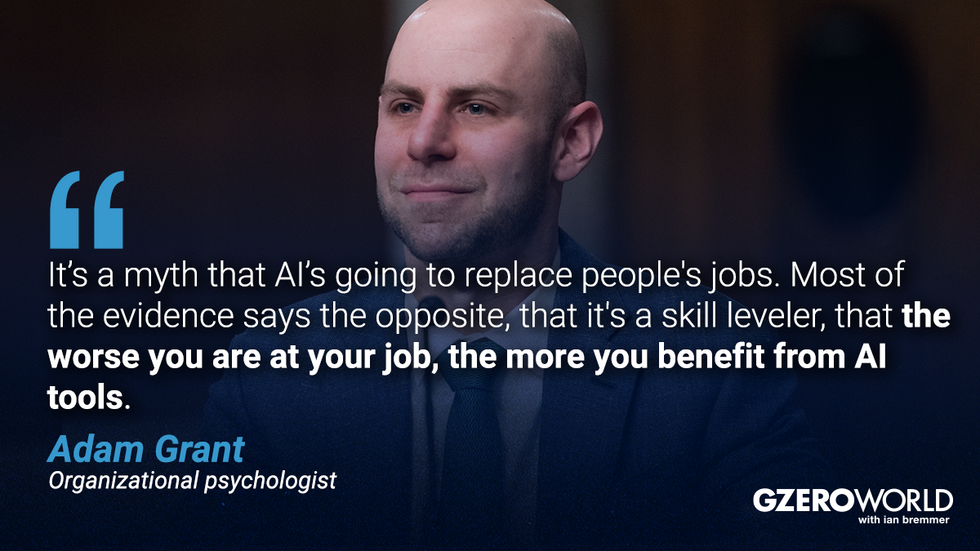
Aired on February 2, 2024
The AI revolution is coming… fast. But what does that mean for your job? Watch Ian Bremmer’s conversation with organizational psychologist Adam Grant.Yuval Noah Harari explains why the world isn't fair (but could be)
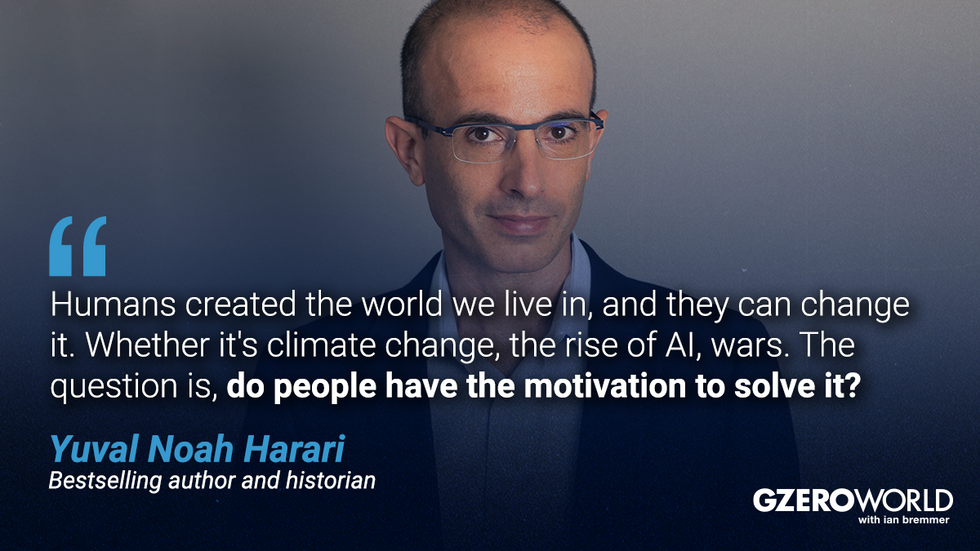
Aired on March 8, 2024
In a conversation filmed live at the historic 92nd Street Y in NYC, Yuval Noah Harari delves into the foundational role of storytelling in human civilization, the existential challenges posed by artificial intelligence, the geopolitical implications of the Ukraine war, and the most pressing questions of the Israeli-Palestinian conflict. Watch the full episode.Thomas L. Friedman on How the Israel-Gaza war could end - if Netanyahu wants it to
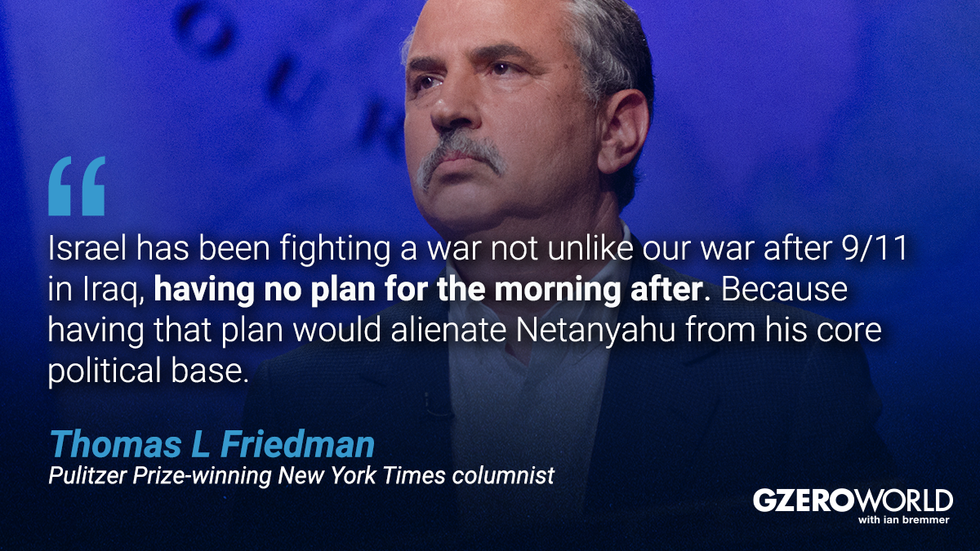
Aired on April 5, 2024
Pulitzer-prize-winning author and New York Times columnist Thomas L. Friedman games out a possible resolution to the war in Gaza and explains why both Israeli Prime Minister Netanyahu and Hamas are obstacles to peace. Watch the full episode.
Emily Bazelon on the major Supreme Court decisions of June 2024
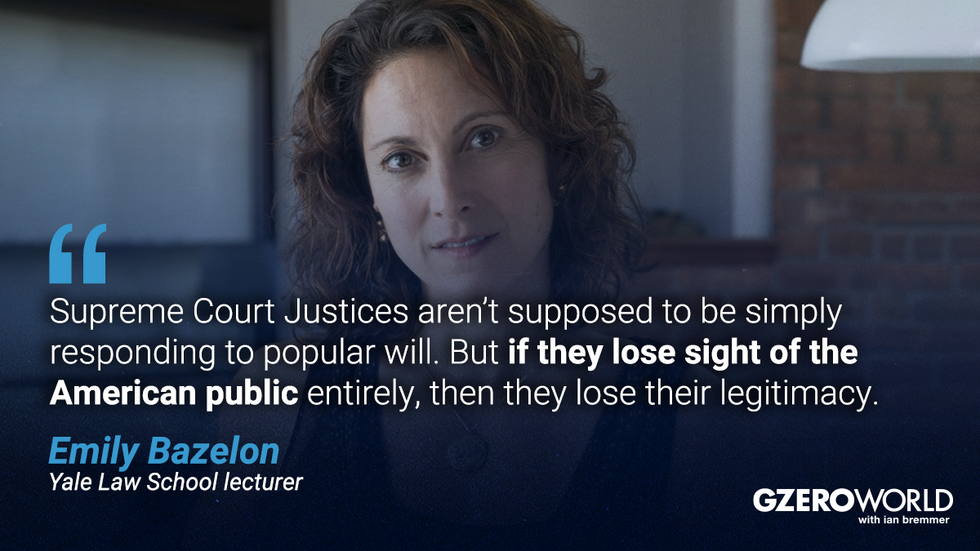
Aired on May 3, 2024
Yale legal scholar and New York Times Magazine staff writer Emily Bazelon unpacks some of the biggest cases that were on the docket this year and how the rulings will impact Americans. Watch the full episode.
Justice & peace in Gaza: The UN Palestinian ambassador's perspective with Riyad Mansour
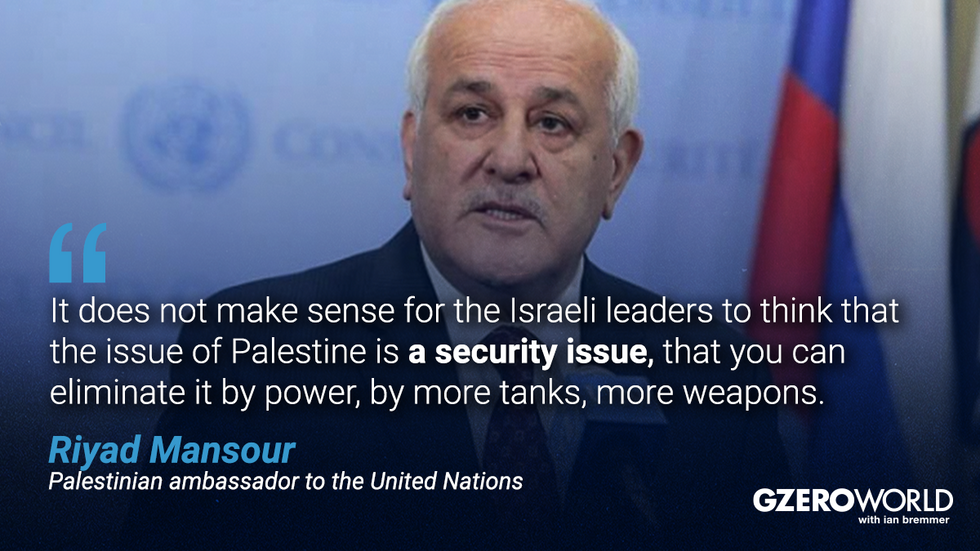
Aired on July 5, 2024
Ian Bremmer sits down with Palestinian Ambassador to the United Nations Riyad Mansour for a candid interview about his role in the UN, the war in Gaza, and how it might end. Watch the full episode.
An exclusive interview with Argentina's radical new president, Javier Milei
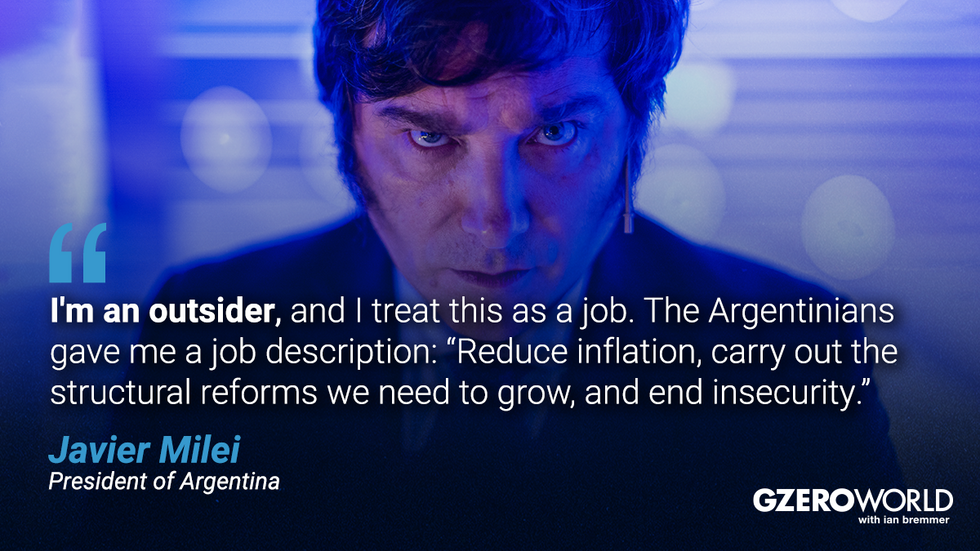
Aired on August 2, 2024
Argentine President Javier Milei defends his radical approach to saving Argentina’s struggling economy, his commitment to aligning with liberal democracies, and his pragmatic stance on international trade and alliances. Watch the full interview.
Why António Guterres believes the UN should lead on AI
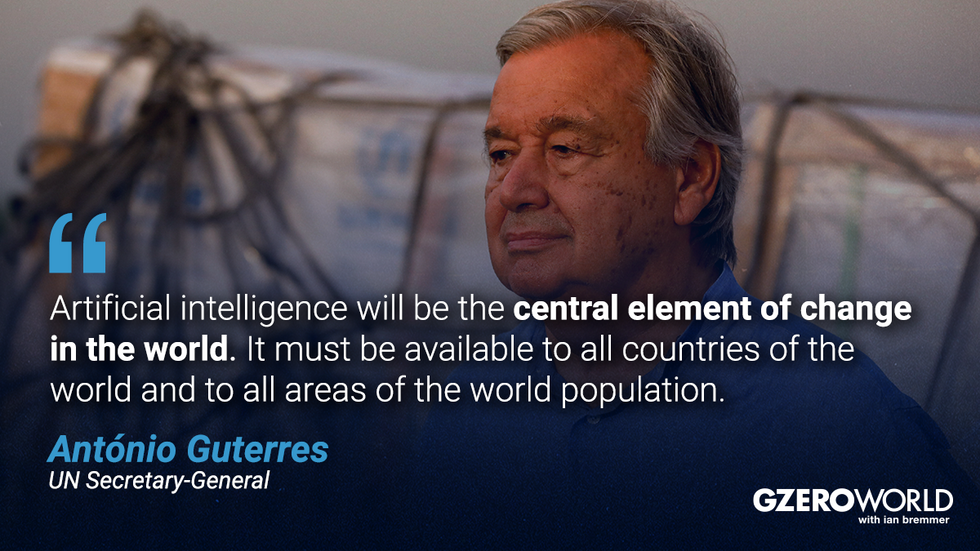
Aired on September 20, 2024
In an exclusive interview for GZERO World, United Nations Secretary-General António Guterres sat with Ian Bremmer on the sidelines of the UN General Assembly to discuss his vision for the future of the UN during his last term in office. Watch the full interview.
Iran's next move: Interview with VP Javad Zarif
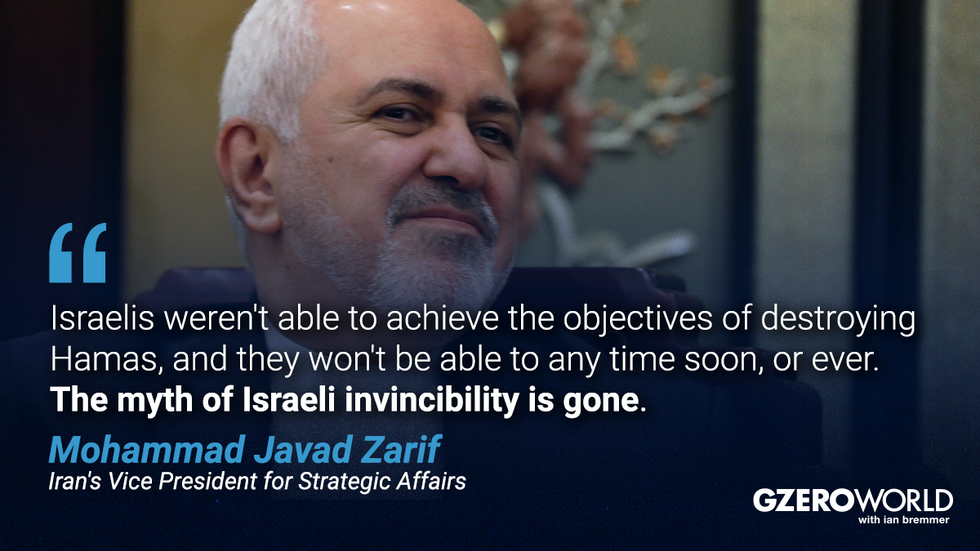
Aired on October 4, 2024
Ian Bremmer sits down with Iran's new Vice President for Strategic Affairs Mohammad Javad Zarif just days before the assassination of Hezbollah leader Hassan Nasrallah to discuss the escalating conflict in the Middle East and where Iran stands. Watch the full episode.
Roberta Metsola on whether Europe can become a global superpower
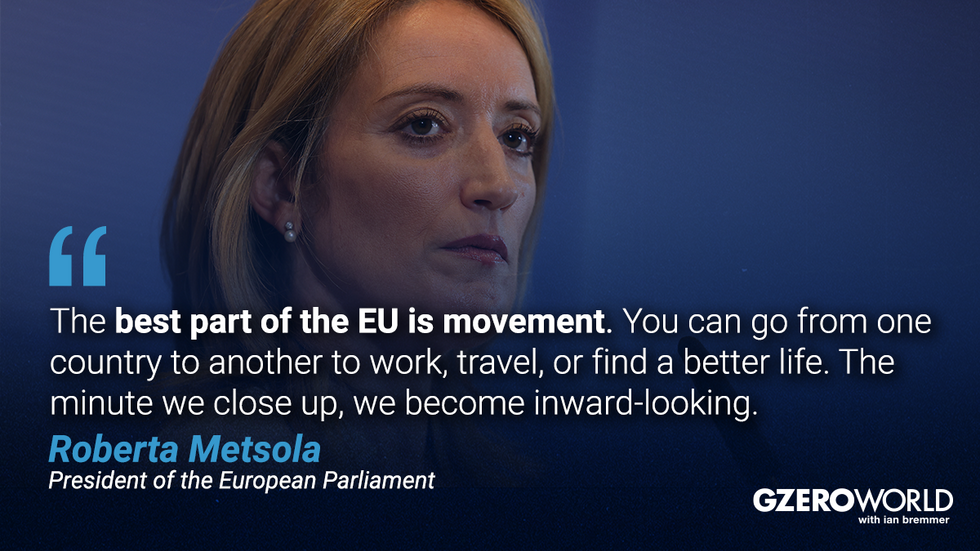
Aired on October 20, 2024
European Parliament President Roberta Metsola discusses Europe’s future amid an ongoing migrant crisis, the war in Ukraine, and an economic slowdown. Can the bloc’s 27 member states stay united? Watch the full episode.
Oren Cass on the case for Trump's tariffs
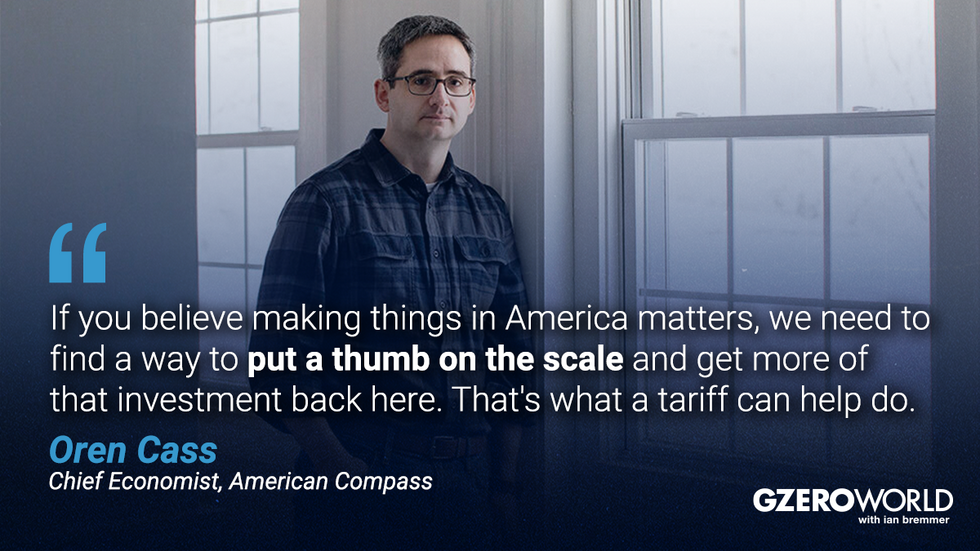
Aired on December 6, 2024
Trump has vowed to raise tariffs, slash business regulation, and deport millions of undocumented immigrants, policies he says will put Americans first. Oren Cass outlines what that will mean practically for workers and consumers. Watch the full episode.
Don’t miss an episode in 2025!
GZERO World airs nationwide on US public television (check local listings), and new digital episodes of GZERO World are released every Monday on YouTube.
Yuval Noah Harari on protecting the right to be stupid
Bestselling author and historian Yuval Noah Harari makes the case for mental self-care in an age where our minds are bombarded with an unprecedented influx of information. In a wide-ranging interview with Ian Bremmer, filmed before a live audience at the 92nd Street Y in New York City, Harari stresses the importance of a healthy ‘'information diet.'
"Our minds were shaped back in the Stone Age," Harari says. Smartphones and social media, designed by the today’s smartest minds, are engineered to 'hack our brains and manipulate our emotions. Harari warns, "Anybody who thinks they are strong enough to resist it is just fooling themselves."
As a public intellectual, Harari is acutely aware of the weight of his words. "We need to build a wall between the mind and the mouth," he tells Bremmer. "I also think that we need a part of preserving privacy is to preserve the right for stupidity."
Watch full episode: Yuval Noah Harari explains why the world isn't fair (but could be)
Catch GZERO World with Ian Bremmer every week online and on US public television. Check local listings.
- Podcast: Tracking the rapid rise of human-enhancing biotech with Siddhartha Mukherjee ›
- Why is America punching below its weight on happiness? ›
- Is life better than ever for the human race? ›
- Podcast: The case for global optimism with Steven Pinker ›
- Why human beings are so easily fooled by AI, psychologist Steven Pinker explains ›
Yuval Noah Harari on the perils of viewing Israel-Palestine through the 'victimhood' context
In a wide-ranging conversation with Ian Bremmer, filmed live at the historic 92nd Street Y in NYC, bestselling author Yuval Noah Harari discusses the profound role narratives play in conflict resolution and identity politics. It’s through this framing that Harari and Ian address the latest conflict between Israel and Gaza. Victimhood, Harari posits, often comes with an element of truth, but it carries the danger of absolving individuals or nations of responsibility. "If you think about yourself primarily as a victim, it relieves you of all responsibility," he explains.
Bremmer also presses Harari on the notion of narratives, and particularly, how to distinguish between patriotism and nationalism. Harari describes patriotism as the love for a unique group and a willingness to do more for them, akin to how we treat our families. Nationalism, however, turns perilous when it crosses into supremacism — when love for one's group becomes an excuse to despise and discriminate against others. Harari asserts, "It becomes dangerous when we start saying this group of people, they are not just unique. They are superior."
Harari defends the possibility of simultaneously supporting the rights and dignities of both Israelis and Palestinians. Holding dual narratives of both people's aspirations to live dignified lives in their homelands is not only possible but necessary, according to Harari. "Just because you are in favor of the rights of Palestinians doesn't mean you have to be also in favor of destroying Israel completely," he states.
Watch full episode: Yuval Noah Harari explains why the world isn't fair (but could be)
Catch GZERO World with Ian Bremmer every week online and on US public television. Check local listings.
A Russian victory would end the global order, says Yuval Noah Harari
The Ukraine war remains the most important geopolitical conflict in the world, says bestselling author and historian Yuval Noah Harari.
In a wide-ranging conversation with Ian Bremmer filmed live at the 92nd Street Y in New York City, Harari says that if Russia wins in Ukraine, the global order as we’ve known it for decades is over. "The most fundamental rule was that you cannot just invade and conquer another country just because you're stronger. This is exactly what Putin is trying to do in Ukraine."
The conversation also touches on the potential ripple effects of Russia's actions, suggesting that a successful annexation could embolden other nations to follow suit, destabilizing global peace. Harari even entertains the notion that we might be in the early stages of a third World War, unrecognized in the current moment, much like the early years of World War II were not immediately identified as such. "If he gets away with it, we'll see more and more Putins all over the world” Harari says. "There is a scenario that we are already living in the midst of the third World War and we just don't know it."
Watch full episode: Yuval Noah Harari explains why the world isn't fair (but could be)
Catch GZERO World with Ian Bremmer every week online and on US public television. Check local listings.
- Armenia’s capital reels from the aftermath of Nagorno-Karabakh & Russia-Ukraine wars ›
- What Ukraine needs after two years of war with Russia ›
- Russia-Ukraine: Two Years of War ›
- Russia-Ukraine war: How we got here ›
- The rise of a leaderless world: Why 2025 marks a turning point, with Francis Fukuyama - GZERO Media ›
Yuval Noah Harari: AI is a “social weapon of mass destruction” to humanity
In a wide-ranging conversation with Ian Bremmer, filmed live at the historic 92nd Street Y in NYC, bestselling author Yuval Noah Harari delves deep into the profound shifts AI is creating in geopolitical power dynamics, narrative control, and the future of humanity.
Highlighting AI's unparalleled capacity to make autonomous decisions and generate original content, Harari underscores the rapid pace at which humans are ceding control over both power and stories to machines. "AI is the first technology in history that can take power away from us,” Harari tells Bremmer.
The discussion also touches on AI's impact on democracy and personal relationships, with Harari emphasizing AI's infiltration into our conversations and its burgeoning ability to simulate intimacy. This, he warns, could "destroy trust between people and destroy the ability to have a conversation," thereby unraveling the fabric of democracy itself. Harari chillingly refers to this potential outcome as "a social weapon of mass destruction." And it’s scaring dictators as much as democratic leaders. “Dictators,” Harari reminds us, “they have problems too.”
Harari's insights into AI's impact on democracy, intimacy, and social cohesion offer a stark vision of the challenges and transformations lying ahead. "The most sophisticated information technology in history, and people can no longer talk with each other?"
Watch full episode: Yuval Noah Harari explains why the world isn't fair (but could be)
Catch GZERO World with Ian Bremmer every week online and on US public television. Check local listings.
- Everybody wants to regulate AI ›
- AI regulation means adapting old laws for new tech: Marietje Schaake ›
- Why human beings are so easily fooled by AI, psychologist Steven Pinker explains ›
- Steven Pinker shares his "relentless optimism" about human progress ›
- From CRISPR to cloning: The science of new humans ›
- Will AI further divide us or help build meaningful connections? - GZERO Media ›
- How neurotech could enhance our brains using AI - GZERO Media ›
- How is AI shaping culture in the art world? - GZERO Media ›
- AI is turbocharging the stock market, but is it all hype? - GZERO Media ›
- Can the UN get the world to agree on AI safety? - GZERO Media ›
Why the world isn't fair: Yuval Noah Harari
In a wide-ranging conversation with Ian Bremmer, filmed live at the historic 92nd Street Y in NYC, bestselling author Yuval Noah Harari delves into the foundational role of storytelling in human civilization, the existential challenges posed by artificial intelligence, the geopolitical implications of the Ukraine war, and the most pressing questions of the Israeli-Palestinian conflict. Harari argues that unlike other species, humans have thrived on their unique ability to construct and believe in shared stories, which has underpinned the formation of societies, governments, and laws. However, this same capability has led to wars, inequality, and exploitation. “Humans don't fight over territory and food,” Harari tells Bremmer. They fight over imaginary stories in their minds."
Harari and Ian discuss the current global crises, including the wars in Ukraine and Gaza, as moments where humanity's collaborative superpower appears to falter. On the Ukraine war, he says that the implications of a Russian victory would spell the end of the global order as we know it. "We could already be in the midst of World War III that started on the 24th of February 2022 with the Russian invasion of Ukraine and we just don't know it yet."
They discuss AI's emerging role in creating and disseminating stories, which represents a new frontier. Harari warns that AI could eventually dominate the world's narratives, making democracy untenable and posing unprecedented challenges to both autocracies and democracies alike. "For the first time in history, we are losing power as a species at a very rapid pace, and similarly, we are also losing control of the stories that we believe."
He also specifically addresses the critical situation in Israel, criticizing government attempts to undermine democratic institutions and pointing to an ideological battle that risks altering the essence of Judaism and Israeli identity. Harari also stresses the importance of reconciling support for Palestinian rights with the defense of Israel's existence, challenging the narrative that these positions are inherently contradictory.
Catch GZERO World with Ian Bremmer every week online and on US public television. Check local listings.
- Modern antisemitism on the rise ›
- The surprising history of disaster ›
- Why do Black people feel "erased" from American history? ›
- Why human beings are so easily fooled by AI, psychologist Steven Pinker explains ›
- Steven Pinker shares his "relentless optimism" about human progress ›
- From CRISPR to cloning: The science of new humans ›
- Yuval Noah Harari: Netanyahu's 'Deep State' fears enabled Oct 7 attack ›
- Israel, Hamas and US in impasse over cease-fire deal - GZERO Media ›
Why the world isn't fair: Yuval Noah Harari on AI, Ukraine, and Gaza
Listen: In the latest episode of the GZERO World Podcast, Ian Bremmer sits with bestselling author and historian Yuval Noah Harari to delve into the transformative power of storytelling, the existential challenges posed by AI, the critical geopolitical stakes of the Ukraine conflict, and the complexities of the Israeli-Palestinian situation, while also exploring personal and societal strategies for navigating an era of unprecedented change and advocating for mindfulness and ethical awareness.
Harari highlights humanity's unique ability to forge societies through shared stories, which, while unifying, can also seed conflict. This is a special, extended version of their interview, taped live at the 92nd Street Y in NYC and exclusive to podcast listeners.
Subscribe to the GZERO World Podcast on Apple Podcasts, Spotify, Stitcher, or your preferred podcast platform, to receive new episodes as soon as they're published.
- Podcast: The path to a two-state solution for Israel & Palestine: Former PM Ehud Barak's perspective ›
- Podcast: The case for global optimism with Steven Pinker ›
- Podcast: How we got here: Evaluating 1619 and US history with Nikole Hannah-Jones ›
- Podcast: Challenging the climate change narrative with Bjorn Lomborg ›
- Ian Bremmer: Understanding the Israel-Hamas war ›
- Yuval Noah Harari: Netanyahu's 'Deep State' fears enabled Oct 7 attack ›
Yuval Noah Harari: Netanyahu's 'Deep State' fears enabled Oct 7 attack
Author and historian Yuval Noah Harari believes that the Israeli government's policies under Prime Minister Benjamin Netanyahu allowed for Hamas’ Oct 7 attack to be as deadly as it was. He points specifically to Netanyahu's efforts to undermine the judiciary and other democratic institutions.
“He was trying to systematically destroy the institutions of Israeli democracy,” Harari tells Ian Bremmer in a live interview at the 92nd Street Y in New York City. He links these domestic political maneuvers to the failure to heed warnings from military and intelligence services about external threats leading up to October 7, arguing that this negligence was influenced by conspiracy theories about a so-called “deep state.”
The problem, Harari says, goes deeper than Netanyahu. He talks about the ideological infighting within the Israeli government as a battle for the country's soul and for Judaism itself. He contrasts the principles of Zionism with those of a rising messianic movement that espouses Jewish supremacy, warning of the dire implications should this faction's vision of a deeply stratified society. “This will change the very meaning of Judaism all over the world.”
So what kind of outcome could both Israelis and Palestinians live with? Harari advocates for defending Israel's right to exist while also ensuring Palestinian rights. He rejects the notion that these positions are mutually exclusive, arguing for a future where both Israelis and Palestinians can live dignified lives within their homelands. “Just because you are in favor of the rights of Palestinians doesn’t mean you have to be also in favor of destroying Israel completely.”
Catch GZERO World with Ian Bremmer every week on US public television (check local listings) and online.
- How Netanyahu used Hamas to avoid talks of a two-state solution ›
- Netanyahu’s failed Gaza strategy ›
- Why the Israel-Hamas war is so divisive ›
- Ian Bremmer: Understanding the Israel-Hamas war ›
- Israel, Hamas and US in impasse over cease-fire deal - GZERO Media ›
- Why the world isn't fair: Yuval Noah Harari on AI, Ukraine, and Gaza - GZERO Media ›
- Israel's global image wanes further after killing of aid workers - GZERO Media ›
- Israel-Hamas war: Netanyahu hostage to far-right coalition, says author Friedman - GZERO Media ›
- Why Israel's Netanyahu continues to antagonize Biden on Gaza - GZERO Media ›
- Israel-Hamas war: Netanyahu hostage to far-right coalition, says author Friedman - GZERO Media ›
- What will Israel's invasion of Rafah look like? - GZERO Media ›
- Israel-Hamas war: Who is responsible for Gaza's enormous civilian death toll? - GZERO Media ›
- Yuval Noah Harari explains why the world isn't fair (but could be) - GZERO Media ›





